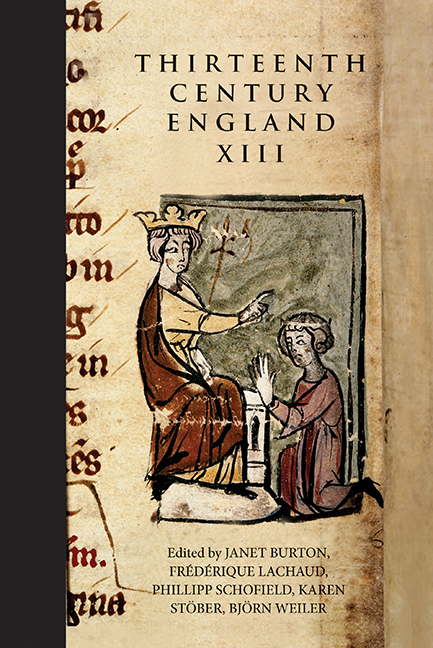Book contents
- Frontmatter
- Contents
- List of Illustrations
- Preface
- Contributors
- Abbreviations
- Political Ideas and Dialogue in England in the Twelfth and Thirteenth Centuries
- Peripatetic and Sedentary Kingship: The Itineraries of John and Henry III
- Peter of Aigueblanche's Support Network
- A Captive King: Henry III between the Battles of Lewes and Evesham, 1264–5
- The Conflictus inter Deum et Diabolum and the Emergence of the Literature of Law in Thirteenth-Century England
- Prosecuting Ravishment in Thirteenth-Century England
- John of Crakehall: The ‘Forgotten’ Baronial Treasurer, 1258–60
- Credit Finance in Thirteenth-Century England: The Ricciardi of Lucca and Edward I, 1272–94
- (Socio)linguistic Realities of Cross-Channel Communication in the Thirteenth Century
- The Treaties of Paris
Political Ideas and Dialogue in England in the Twelfth and Thirteenth Centuries
Published online by Cambridge University Press: 15 September 2017
- Frontmatter
- Contents
- List of Illustrations
- Preface
- Contributors
- Abbreviations
- Political Ideas and Dialogue in England in the Twelfth and Thirteenth Centuries
- Peripatetic and Sedentary Kingship: The Itineraries of John and Henry III
- Peter of Aigueblanche's Support Network
- A Captive King: Henry III between the Battles of Lewes and Evesham, 1264–5
- The Conflictus inter Deum et Diabolum and the Emergence of the Literature of Law in Thirteenth-Century England
- Prosecuting Ravishment in Thirteenth-Century England
- John of Crakehall: The ‘Forgotten’ Baronial Treasurer, 1258–60
- Credit Finance in Thirteenth-Century England: The Ricciardi of Lucca and Edward I, 1272–94
- (Socio)linguistic Realities of Cross-Channel Communication in the Thirteenth Century
- The Treaties of Paris
Summary
In the years between the start of the twelfth century and the end of the thirteenth, ideas about kingship developed significantly across Europe and new forms of political dialogue emerged. To this, England was no exception. While what follows is a reminder of England's historical integration with Europe, most importantly it discusses the way in which widely shared ideas merged with local, in some ways very distinctive, traditions and circumstances to produce a particular political dialogue within England. At the beginning of the twelfth century, many ideas about kingship were well established. First, it was accepted that the king had both private, or personal, and public authority. The former was conveyed by the fact that he was the greatest lord in the land – the head of the feudal hierarchy; as such, he held territory (the royal demesne) and property, and had tenants and vassals from whom he was entitled to expect military service, an arrangement which was replicated further down the feudal chain. The king's public authority, on the other hand, was derived from the fact that he was the accepted ruler of a realm. This meant that certain regnal rights, such as entitlement to taxation, were conferred on him, but it also brought with it responsibilities. Order within the kingdom was, in theory, his to maintain – hence the contemporary phrase ‘the king's peace’. In practice this usually meant ultimate jurisdiction over crimes and could, under the most active rulers, lead to the promulgation of law codes. The king had at the same time a duty to defend his subjects from external foes. In short, the rights the king could claim were directly related to his responsibility for the overall maintenance of the common welfare, the ‘communis utilitas’, of his subjects.
Such was the situation in c. 1100 and although these fundamental tenets of royal authority never really changed, the public authority of the king was subjected to a process of increasing definition during the course of the following two centuries. The further spread of literacy, and, with it, techniques of accounting and administration, the emergence of the universities, and particularly the study of the ‘learned’ canon and Roman laws, as well as the work of theologians (especially the scholastics) all contributed to these developments.
- Type
- Chapter
- Information
- Thirteenth Century England XIIIProceedings of the Paris Conference, 2009, pp. 1 - 10Publisher: Boydell & BrewerPrint publication year: 2011



